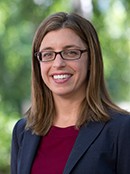 The Temple Law community
The Temple Law community
will welcome a new faculty member in the fall. Lauren Ouziel,
who will teach Evidence, Criminal Procedure, and Civil Procedure,
joins the faculty after practicing for several years as a federal
prosecutor in New York and Philadelphia. We caught up with
her as she settled in to her office in Klein Hall, where she spoke
with us about her love for the law, her scholarship, and what she
wants to accomplish here at Temple Law.
TL: You’ve
clerked, worked in private practice, and spent eight years as a
federal prosecutor in New York and Philadelphia. Now you’re
joining the academic world as a full-time professor. What
inspired you to shift from legal practice to legal
education?
LO: I love being a lawyer, and I loved
practicing law. It’s engaging, challenging, at times
thrilling. I have found it equally rewarding, though, to be able to
take a few steps back and consider how my own experiences fit in to
the much larger systemic picture-and why and how that picture looks
the way it does. In my practice, I also very much enjoyed
mentoring newer lawyers as well as law students, and I look forward
to mentoring even more as a law professor.
TL:
Specifically, what was it about Temple Law as an academic
institution that attracted you? What do you hope to accomplish
here?
LO: I wanted to be at a school that values both
teaching and scholarship, because I value both. I hope to
instill in my students curiosity, critical and strategic thinking,
and a deeper, more nuanced insight into some of the pressing legal
issues of today (and tomorrow). And through my scholarship I hope
to build upon those insights, further enriching my students’
learning.
TL: Do you draw
upon your experiences in practice when you teach? How?
LO: All the time! It’s impossible for me
not to draw on my experiences, they inflect every aspect of my
classes. I might bring to life a rule of evidence or legal
issue with reference to a particular case I tried; or I might tell
a student who offers a novel legal argument: “Great! I love it, and
here’s all the reasons you should be right-but a judge probably
won’t buy it, and here’s why.”
TL: Let’s talk about your scholarship.
You focus on “institutional dynamics in criminal investigation and
adjudication.” Can you elaborate on the idea of institutional
dynamics? What’s the basic question or problem that you’re
trying to address?
LO: Criminal law on the books is very different
from criminal law in the courthouse and in our communities.
Legislators write laws, but prosecutors and police decide which
laws to enforce, and against whom. Legislators and sentencing
commissions suggest penalties for crimes; but prosecutors decide,
by virtue of the charges they bring, which penalties will apply,
and judges decide what specific sentence will be imposed in a given
case. And in a system that functions almost entirely through
plea-bargaining, prosecutors’ decisions-which cases to charge, what
charges to bring, and what charges to dismiss-reflect the realities
of how juries or judges decide tried cases, and how judges
sentence. To understand why our laws are enforced the way
they are, then, we need to ask what affects these dynamics. What
institutional pressures or incentives cause police or prosecutors
to focus on certain crimes and not others? How do law enforcement
decisions impact communities, and in turn the juries that are drawn
from those communities? And how do (or how should) community
norms influence judges and sentencing commissions?
TL: Why is this
issue so important to you? How did you come to be so
passionate about it?
LO: Constitutional doctrine and legislation do
very little, in practice, to regulate the criminal justice
system. Any real balancing of the system comes primarily
through the interplay of the groups that comprise it: prosecutors,
judges, juries, sentencing commissions, legislatures. To the
extent we think criminal justice in this country should be
administered differently than it currently is, we need to consider
what motivates the actors within each of these institutions, and
how laws, policies and norms influence those motivations.
